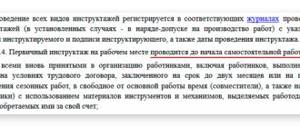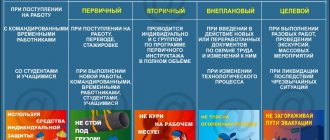The Labor Code provides for the possibility of working for persons with disabilities and disabilities. The law provides that the employer does not have the right to refuse to hire such employees if the reasons for the refusal are not related to the professional skills of the applicant. Separately, there is a need to regulate the working conditions for these individuals. The corresponding legal acts are available in the legislation, but their presence is also desirable in the local regulations of the enterprise.
Disabled status and supporting documents of the employee
According to Article 1 No. 181-FZ, a disabled person is an employee who has a health disorder with a persistent disorder of body functions, caused by diseases, consequences of injuries or defects, leading to limitation of life activity and necessitating his social protection. Recognition is carried out by the federal institution of medical and social examination (ITU). According to the Labor Code of the Russian Federation, disabled people, as confirmation of their status, present an ITU certificate and an individual rehabilitation or habilitation program (until 01/01/2016, the IPR was issued, from 01/01/2016 - IPRA). Article 23 No. 181-FZ establishes that such employees employed in companies of any legal form and type of ownership are provided with the necessary working conditions in accordance with the employee’s IPR (IPRA).
Presentation of such documents is the right, but not the obligation of the employee. Article 65 of the Labor Code of the Russian Federation prohibits the requirement of documents not provided for by current legislation.
If the documents are presented by the employee, compliance with the rights and guarantees for the disabled person is the responsibility of the employer.
IMPORTANT!
According to clause 9 of Rules No. 95, disability of group I is established for two years; Groups II, III - only for one year (in rare cases, an indefinite period is established). After this period, the employee is required to undergo re-examination, where the issue of confirming the conditions for recognizing a person as disabled and the degree of limitation of his life activity is decided anew. If the employee does not undergo re-examination within the prescribed period or his condition for the subsequent period is not confirmed, he loses his status, accordingly, all guarantees and rights related to disability are terminated.
The right and obligation of a disabled person of group 2 to work
Based on the order of the Ministry of Labor No. 1024n dated December 17, 2015 “On the criteria applied by the ITU...”, disability of group 2 is assigned to people whose ability for self-care is limited to 70–80% of severity. Violations are caused by diseases, including congenital and occupational ones, injuries of varying severity, mental disorders and conditions. That is, their legal capacity is partially limited, which means that such people retain their abilities for certain types of activities. Moreover, the status of such disability can be assigned temporarily or without time restrictions.
Rice. 1. People with disabilities have the right, but not the obligation, to work
After 2012, the division of group 2 into working and non-working was abolished. This means that no one can deprive a person with disabilities of the right to work - it is enshrined in the Constitution and is not limited to diagnoses, status, or abilities.
It turns out that a disabled person assigned to group 2 can work. Whether he will find a job depends only on desire, physical and mental capabilities.
But is he obliged to work? Even with minimal restrictions, a person may refuse employment. If a disabled person has enough social pension to live on, or is supported by relatives, no one can force him to work. Refusal to hire does not incur any legal or administrative liability. However, it should be taken into account that without work experience, upon reaching retirement age, a pensioner with a disability will only receive a social pension or benefit. While working disabled people will be able to earn a labor pension.
Disability
Not all activities are available to applicants with disabilities. What kind of work a disabled person can do is not specified in any legislative acts. But the medical-sanitary examination commission may, based on the results of the examination, impose a ban on certain work, up to and including denial of employment.
Rice. 2. Society of the blind “Niva” in the Pskov region
To determine the level of restrictions, degrees have been introduced that are indicated in the ITU certificate, as well as in the individual rehabilitation plan. When choosing a type of activity, it is necessary to take into account the degree of restrictions:
- 1st degree of restrictions.
Recommended for disabled workers for whom certain conditions are not required. Restrictions may be expressed by the inability to continue working in the profession, a decrease in qualifications, or a decrease in the volume of work performed.
- 2nd degree of restrictions.
Workers must be provided with working conditions that comply with ITU recommendations. Additional tools, devices, and equipment may be required. Recommendations regarding prohibited professions are prescribed in the IPR. The employer is obliged to provide such an employee with the specified working conditions. However, a disabled person may voluntarily waive all or part of the conditions of the IPR, which relieves the employer of liability.
- 3rd degree of restrictions.
The most severe degree is assigned to people who, according to the ITU, are unable to work. The assignment of such a degree deprives a person of the legal right to work, since the employer cannot officially hire a person with such a certificate.
In fact, the 3rd degree is still the same non-working group. Therefore, many controversial issues are associated with it. On the one hand, the employee may not report the presence of restrictions and refuse benefits. On the other hand, certain deviations can indeed threaten not only the labor process, but also the health and life of the disabled person himself and other people. Human rights organizations also challenge such bans, since the rights of people with disabilities are violated, who are deprived not only of work, but also of support from the Employment Center.
Note! If the commission has not identified any grounds for restrictions, the degree is not awarded and is indicated in the IPR in the “Not available” column.
Contraindications to work
Contraindications are indicated in the IPR based on the commission’s findings on an individual basis. But the employee himself must understand what difficulties he may encounter if these recommendations are ignored.
Rice. 3. Ural educational and production enterprise for the deaf and dumb
Table 1. Activities contraindicated for people with disability group 2, selectively
| Diseases | Contraindications |
| Disorders of the internal secretion organs |
|
| Digestive system diseases | |
| Cardiovascular diseases | |
| Mental disorders | |
| Mental disorders |
|
| Diseases of the visual apparatus |
|
| Speech disorders |
|
| Hearing impairment |
|
Separately, it makes sense to dwell on work at night. Despite the diagnosis, it is illegal to employ disabled people to work at night. Time is limited from 6:00 a.m. to 10:00 p.m. If you want to get a job as a watchman or watchman, you need to look for a schedule with day and evening shifts.
Peculiarities of labor regulation for disabled people
The employment contract of an employee with disabled status should not differ from other employees of a legal entity. It is not allowed to worsen the situation of employees with health limitations compared to other employees. However, such an agreement has a number of features:
- The Labor Code for disabled people of group 2, as well as for first-graders, establishes a reduced working time - no more than 35 hours a week with full pay;
- The duration of daily work or shift for disabled people is determined in accordance with a medical report (IPR or IPRA). If the length of an employee’s working hours differs from the general rules of the employing company, a condition on an individual work schedule or an individual work schedule is included in the employment contract (paragraph 6 of part 2 of Article 57 of the Labor Code of the Russian Federation).
Exception: the labor of disabled people of group 3 in the Labor Code is not reduced in terms of working hours - 40 hours per week. However, in accordance with Articles 11, 23 of Law No. 181-FZ, if the duration of working hours is specified in the IPR (IPRA), the employer is obliged to establish a part-time working day (shift) or a part-time working week, but wages are paid in proportion to the time worked (or in depending on the amount of work performed).
Other guarantees established by the Labor Code of the Russian Federation:
- the involvement of workers who have been assigned the status of disabled people to work overtime, work on weekends or holidays, and at night can be done only with their written consent and provided that this is not prohibited for them due to health reasons in accordance with a medical report (Article 96 of the Labor Code RF, Article 99 of the Labor Code of the Russian Federation, Article 113 of the Labor Code of the Russian Federation). The employee has the right to agree to the offered work or refuse it. Payment for overtime work and work on weekends and holidays to the employee is carried out in accordance with the general procedure. Thus, the employer’s obligation to properly document:
- notification to an employee who has the right to refuse overtime work (work on weekends or holidays, at night);
- notification to an employee about being required to work overtime (to work on weekends or holidays, at night);
- written consent of the employee to engage in overtime work (work on weekends or holidays, at night);
IMPORTANT!
Disabled people from Chernobyl additionally have the right:
- for regular annual paid leave at a time convenient for them,
- for an additional leave of 14 days (paid by social protection authorities in accordance with paragraph 5 of Article 14 of the Law of the Russian Federation of May 15, 1991 No. 1244-1 “On the social protection of citizens exposed to radiation as a result of the disaster at the Chernobyl nuclear power plant”).
Disabled employee of group 2: features of personnel records
Based on the fact that a shortened working day is provided for such employees, the employee responsible for timesheets should be careful and indicate the duration of the working day according to the IPR. Medical recommendations must also be relied upon when assigning work assignments, night shifts, and business trips.
People with disabilities: working conditions
People with disabilities in Russia are most often called disabled; this is an established term that is also used in regulatory legal acts. One of the ways to rehabilitate disabled people is to employ them. The state provides employers with certain benefits in relation to disabled employees, such as, for example, reduced rates of insurance premiums for payments in favor of this category of employees. At the same time, certain requirements are imposed on the working conditions of disabled people. What are the main legal provisions governing the employment relationship of persons with disabilities? What points should employers who employ people with disabilities pay special attention to?
Legal regulation of the work of disabled people
Legal regulation of the work of disabled people is carried out mainly in accordance with the norms of the Labor Code of the Russian Federation and Federal Law No. 181-FZ of November 24, 1995 “On the social protection of disabled people in the Russian Federation” (hereinafter referred to as Federal Law No. 181-FZ) .







